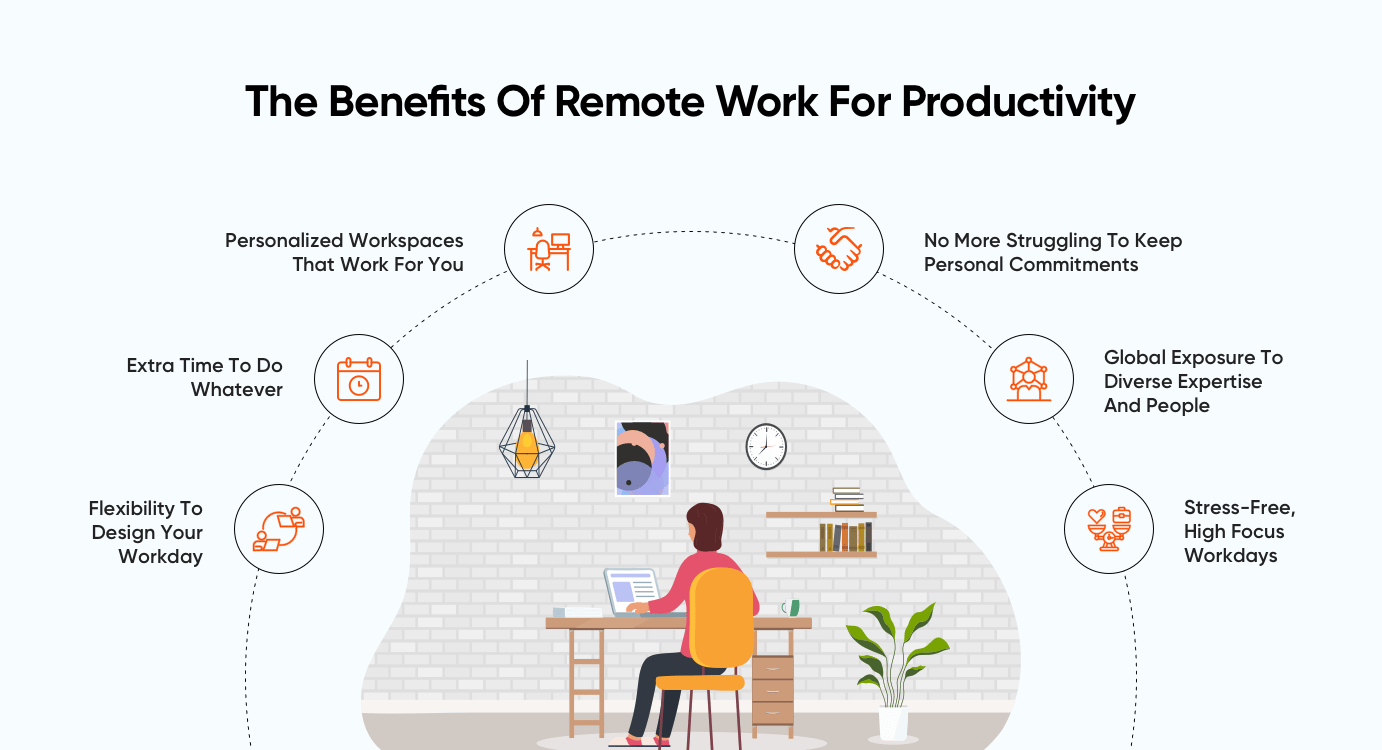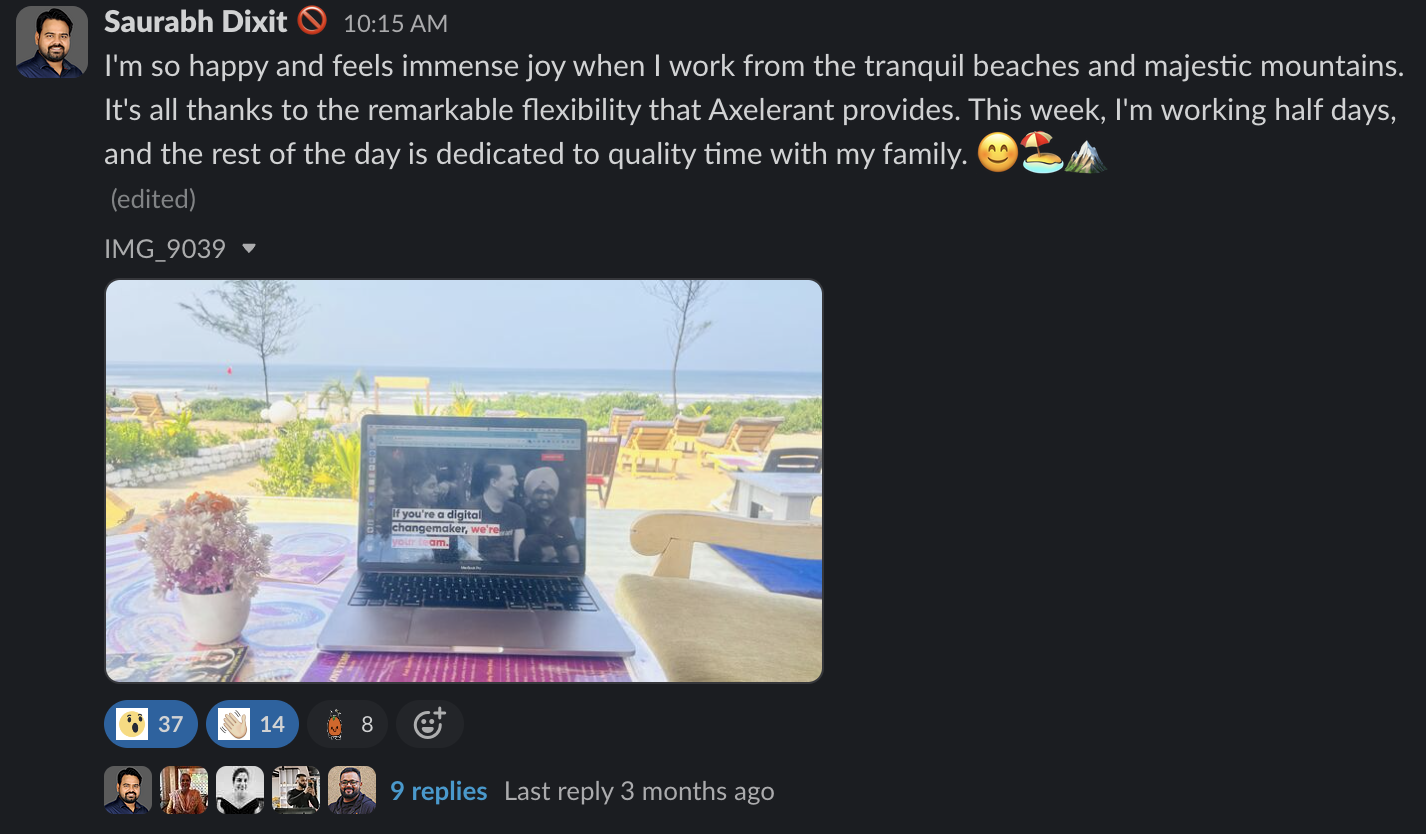Introduction
This article captures the various benefits and advantages of remote work on productivity, and also highlights the potential challenges of working from home.
Productivity is an elusive magic bullet. And everybody is out to discover its best secrets and hacks.
There's a big debate on how remote work affects productivity.
Some consider remote work a productivity killer, and some the opposite.
You may be considering these very questions.
Are there any benefits to working remotely? Can it be advantageous to work from home than an office? Can remote work help increase productivity?
The straight answer is that, in most cases, remote work has been proven to increase people's productivity and efficiency.
Some research suggests that it also boosts creativity and enables remote workers to enjoy a better quality of life.
What Is Productivity?
It might seem odd to even talk about this. But people often have a crooked notion about being productive.
Productivity is entirely subjective, depending on where you work.
For a factory worker, productivity would mean churning out more products within a fixed period. For a judge, it would mean dispensing proper legal judgment on cases, which might have a bearing on similar cases later.
But in every scenario, people agree on the following definition.
Productivity measures how efficiently one uses their resources—time, effort, and skills—to achieve goals.
It's not just about getting things done, but getting the right things done most effectively.
In a corporate setting, that makes a worker more efficient and productive.
It's about optimizing one's workflow and constantly refining the approach.
It's not a race against the clock but a strategic dance with it.
Sometimes, you need to slow down to get creative and solve unique problems, and sometimes, it's like typing one to hundred like an old Western gunslinger; the fastest finger wins.

The Benefits Of Remote Work For Productivity
There's a reason why people are finding it so hard to return to the office in person.
Because once you've worked remotely, doing the same work you were doing in the office, you know. The cat's out of the bag.
Not much beats the benefits and advantages of remote work.
In 2020, a study by Stanford University revealed remote workers to be 5% more productive than their in-office peers. By 2022, as businesses invested in adapting to better work practices and tools, the productivity gap increased by 9%.
Here are some reasons why working from home is good for you.

Flexibility To Design Your Workday
In most mature workplaces—that offer remote work, or are completely remote like Axelerant—you can design your workday according to your needs and commitments in life.
In a traditional physical office, people are usually expected to punch in to work at their assigned shift timings.
Some even go as far as deducting half a day's compensation for being 15 minutes late.
It's no wonder that flexibility was voted as the top benefit in our organization.
Hetal Mistry, Director of Global Delivery, used this benefit to be there for her son and ailing husband during one of the most trying times in her life.
Many team members, like Hetal, have clinched their promotions at work while successfully keeping their personal commitments—because of this ability to work from where they want, when they want.
In many cases, having flexibility at work becomes the difference between having a thriving career and being out of work.
A 2022 Future Forum report revealed that workers with full schedule flexibility experience 29% higher productivity and 53% greater ability to focus than workers with no ability to shift their schedule.
Extra Time To Do Whatever
Imagine not having to commute to work every day.
O, the joy of it!
The pure pleasure of not getting up hours earlier to dress up, gobble down some gruel you'd tell yourself is breakfast, and jet out of home—just to be endlessly stuck in traffic.
Remote work opens up a Pandora's box of extra hours in your life.
The Becker Friedman Institute at the University of Chicago discovered that remote work saved about two hours per week, per worker in 2021 and 2022.
Precious time that you can use to explore new coding languages, contribute to open-source projects or unwind with activities you love.
It empowers you to transform your spare moments into opportunities for skill enhancement, creativity, or a well-deserved break.
Personalized Workspaces That Work For You
Remote work empowers individuals to shape their workspaces according to their preferences, fostering a more productive and comfortable environment.
According to a study by Harvard Business Review, workers with control over their workspace reported a 32% increase in overall well-being and job satisfaction.
The study also notes that traditional office settings that don't provide any choice or control over a person's office settings hurt focus and productivity.
The Journal of Environmental Psychology supports this, revealing that environmental control is positively associated with job satisfaction, enhanced focus, and creativity.
The overall result is increased, unhindered productivity.
In a remote setting, you can choose the location, ambiance, and tools that optimize your workflow, ultimately contributing to a more efficient and enjoyable work experience.
Here are some tips to set up your remote workstation.

No More Struggling To Keep Personal Commitments
Your days of being unable to make time for personal commitments are over.
No more will professional obligations keep you from attending your child's school play or taking that midday yoga class.
Remote work liberates you from the rigid constraints of a traditional office schedule.
You can seamlessly integrate personal activities into your day without compromising on productivity. Whether it's a quick grocery run, a doctor's appointment, or spending quality time with loved ones, you can fulfill personal commitments without the stress of work interference.
Many team members use this advantage of working online to go on long workations, enjoying a harmonious blend of work and travel.
Global Exposure To Diverse Expertise And People
In a remote work setup, you get more than just a job; you gain a global network of diverse professionals.
You will be colleagues with people from different continents with unique perspectives.
This global exposure exposes one to diverse expertise, ideas, and working styles.
It also opens doors to broader insights and collaborative learning, fostering a rich and dynamic professional ecosystem.
It's one of the strongest benefits of remote work—for employers and team members alike.
It enabled us to do meaningful work for clients like Doctors Without Borders, facilitating millions of dollars in donations through their website during wars and conflicts in Eastern Europe.
Stress-Free, High Focus Workdays
Many workers view the chance to work from home as an invaluable perk.
A survey of 3,000 workers at top companies such as Google, Amazon, and Microsoft found that 64% would prefer permanent work-from-home over a $30,000 pay raise.
Wonder why that is?
Apart from the already stated benefits, working from home is much less stressful than in a traditional office setting (given that the organization has set up proper boundaries; more on this later).
It eliminates the stresses that come with:
- Daily commute
- Rigidity of conforming to a behavioral code of an office (which can often be toxic)
- Rigidity of maintaining a fixed schedule
- Dealing with people with hostile personality traits, in person, in an office
- Confinement to a fixed workspace
And working from home empowers one by:
- Reducing frequent interruptions from colleagues or unnecessary meetings
- Giving you control over when and how you respond to people and protecting your precious, high-focus, high-energy hours for getting stuff done
- Allowing you as many breaks as you want (nobody's looking over your shoulders to see how long you spent in the washroom)

How Can You Increase Your Productivity While Working Remotely?
You can leverage the benefits of working remotely
to increase your productivity remarkably.
Make yourself more efficient and enjoy the work-life people dream of.
The crux of mastering remote work is taking charge of your time and energy.
- Decide your work schedule based on priorities: Divide your work based on how soon something needs to get done and for what impact
- Plan and divide your work with useful tools: Use apps like Google Tasks and Todoist to set task reminders in specific time pockets
- Pay extra focus to your energy: More people should be discussing energy management already. If you're a morning person, capitalize on this by scheduling your most challenging tasks during that hour. Save less demanding work for when your energy naturally dips
- Plan for procrastination: Planning for it takes away feelings of guilt that come afterward. Keep a buffer time of 45 to 60 minutes spread throughout the day to not do your work
- Communicate your work preferences to your team: Once you finalize what work you're doing and when, let your team in on your schedule for collaboration and meetings
- Block time on your calendar: Set up your schedule on your work calendar that's preferably accessible to all team members to ensure better time alignment
- Stick to your routine: This sounds radically simple, yet it is the most difficult to pull off. Sticking to the decided routine is key to a successful remote work experience and productivity, as your body and mind will know you mean business if you sit down at work consistently at the same time
- Leave space for some flexibility: This sounds counterintuitive to the previous point. But you need to find a balance between a strict routine and spontaneity. People and commitments will come your way, and it'd sometimes be impossible to dodge them. Things often have a way of going differently than planned
- Create or choose your ideal work zone: One of the absolute pleasures of remote work is designing your workspace how you want. Keep plants; don't keep plants. Have proper artificial lighting, or sit near the window. Work standing up or snug in a comfortable ergonomic chair. It's up to you
- Track your progress: Always be on top of your progress. With the kind of autonomy and flexibility remote work offers, it's often a slippery slope if you don't keep track of your progress. Applications like Jira and Asana will come in handy if you transform your work into achievable goals and place milestones to gauge how well you're progressing
- Build feedback loops: To avoid getting blindsided by critical performance feedback, create your own feedback loops. Ask questions that matter to you and tell you precisely where you are with your work and meeting expectations
You can learn about these points in more detail here.
Potential Challenges Of Remote Work You Should Know
Nothing is without its challenges.
The same goes for working from home.
And these challenges become stark for people new to this way of life.
Feelings Of Isolation
It's possible to feel isolated while working remotely, especially if you live alone or have few chances of social interaction.
Most conversations at work revolve around one's work. And that is completely fine.
But in a remote setting, having conversations beyond the scope of work is critical—on hobbies, shared interests, or just talking about life in general.
We realized that conscious investment and building systems to foster team member connection were indispensable to a thriving remote work culture.
- Team offsites in various locations
- Dout calls
- Organization-sponsored team meet-ups
- Fun, team activities designed on shared interests like art workshops, parenting classes, stand-up comedy, singing shows, etc.
- All team meet-ups and parties around sponsored food and out-of-work chats
- Coaching by professional, in-house performance coaches to create psychologically safe spaces within teams to promote open, kind communication
These are some of the proactive steps we've taken to minimize feelings of isolation, and any organization that cares for its people can follow.
Overlapping Boundaries
This happens when people in leadership positions need more maturity to realize that a successful work culture needs boundaries.
One of the most fundamental boundaries is setting up, adhering to, and respecting an agreed-upon work schedule that works for the individual and the team.
This allows team members to maintain a healthy balance between work and downtime.
When companies lack or disregard such boundaries, people's work and personal lives flow into each other in a toxic way.
The result is taking client calls at midnight, waking up to the computer screen in the morning, struggling with work and personal commitments, and leaving the company behind in an embarrassingly short time.
Burned out and dissatisfied.
Technical Challenges
Successful remote work requires proper tools to manage every aspect of the business and its operations.
There are numerous processes involved in running a business: payroll, people management, promotions, logistics, deliveries, analytics, communication, record-keeping, taxes, audits, profits, losses, and the list goes on.
Every process requires a designated tool to complete the work systematically and on time, while allowing for seamless collaboration.
Not having proper tools and associated healthy collaboration and communication practices can be draining for team members.
They will cause losses in time, resources, and valuable energy that could've been used to create and provide value to the clients.
Probable Distractions
In the absence of a proper home office setup, it is possible to be distracted from work.
We all have personal commitments at home requiring attention and time.
For instance, kids become more curious and conversational when they see their elders on video calls.
While the occasional peep-in is unavoidable, distractions can become a nuisance to work if not controlled.
One can minimize interruptions by using noise-canceling headphones, establishing a structured daily routine, setting a closed-door workspace, and communicating clear boundaries to family members.
Is Remote Work For You?
If you're still on the fence about a remote working opportunity, use these questions to introspect:
- Where are you working now, and what made you think of changing?
- Why do you want a remote position?
- How do you see your ideal work life? Does it align with what the company has to offer for its people?
- What does growth mean for you?
- Do you enjoy your work? Would you do it even if nobody runs behind you? Or is it just a set of actions to make a livelihood and avoid the societal judgment of not working?
Honest answers to these questions should make it easier for you to take the next step.
One's remote work experience largely depends upon the organization.
If it's not built to set you up for success, you might return to a physical office with an added spring to your step.
But what if it cares for its people and actively invests in their growth and well-being?
Work would never be the same for you.
The ball's in your court. Choose wisely.


Rohit Ganguly, Content Marketer
Rohit is a content marketer first and a YouTuber second. He loves to interact with animals, feed them, clean his apartment, and spend time with friends and family. Curious by nature, he also enjoys literature, movies, meditation, and calligraphy.

 We respect your privacy. Your information is safe.
We respect your privacy. Your information is safe.



Leave us a comment